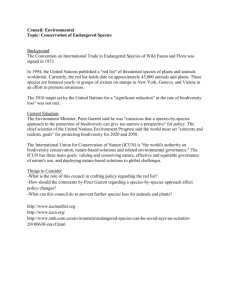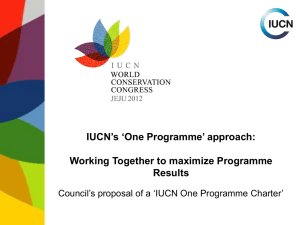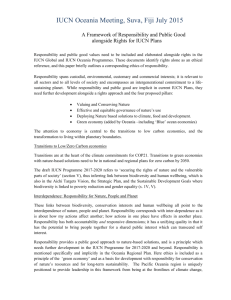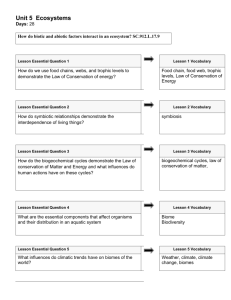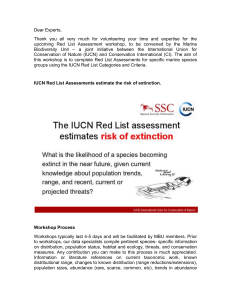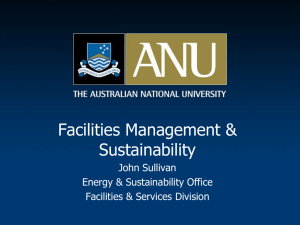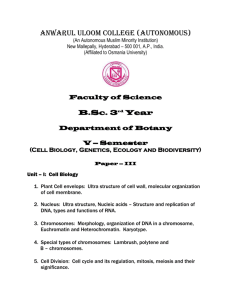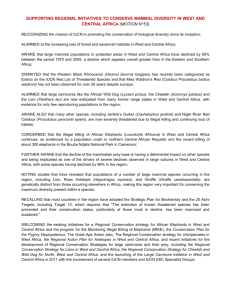IUCN Eastern and Southern Africa Regional Office
advertisement
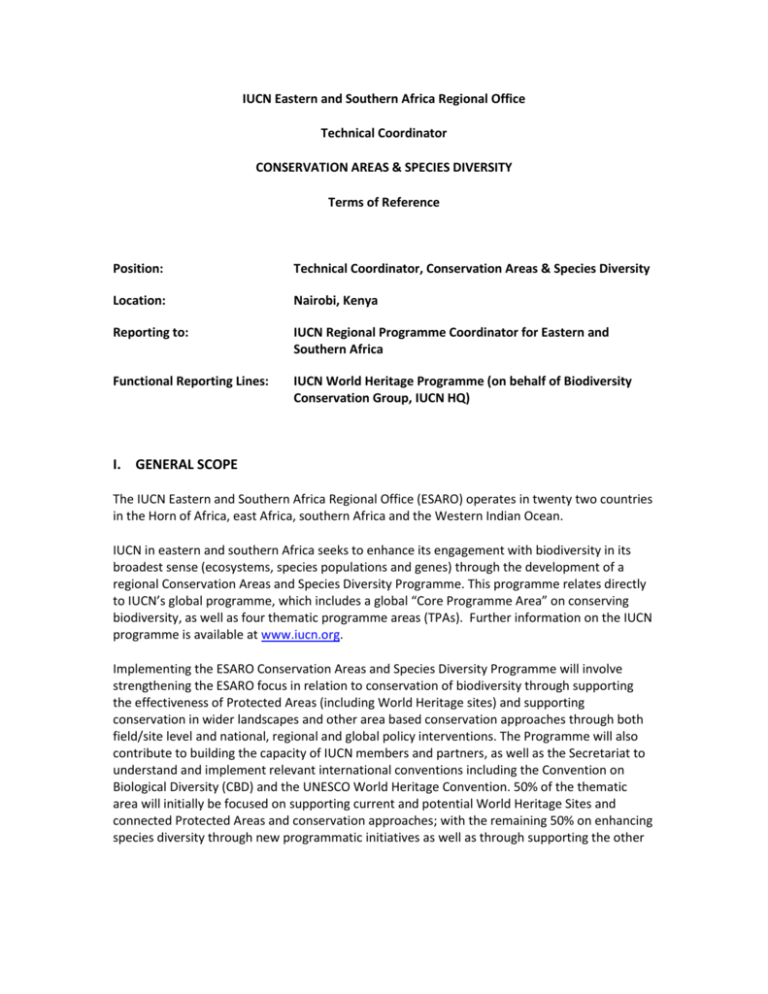
IUCN Eastern and Southern Africa Regional Office Technical Coordinator CONSERVATION AREAS & SPECIES DIVERSITY Terms of Reference Position: Technical Coordinator, Conservation Areas & Species Diversity Location: Nairobi, Kenya Reporting to: IUCN Regional Programme Coordinator for Eastern and Southern Africa Functional Reporting Lines: IUCN World Heritage Programme (on behalf of Biodiversity Conservation Group, IUCN HQ) I. GENERAL SCOPE The IUCN Eastern and Southern Africa Regional Office (ESARO) operates in twenty two countries in the Horn of Africa, east Africa, southern Africa and the Western Indian Ocean. IUCN in eastern and southern Africa seeks to enhance its engagement with biodiversity in its broadest sense (ecosystems, species populations and genes) through the development of a regional Conservation Areas and Species Diversity Programme. This programme relates directly to IUCN’s global programme, which includes a global “Core Programme Area” on conserving biodiversity, as well as four thematic programme areas (TPAs). Further information on the IUCN programme is available at www.iucn.org. Implementing the ESARO Conservation Areas and Species Diversity Programme will involve strengthening the ESARO focus in relation to conservation of biodiversity through supporting the effectiveness of Protected Areas (including World Heritage sites) and supporting conservation in wider landscapes and other area based conservation approaches through both field/site level and national, regional and global policy interventions. The Programme will also contribute to building the capacity of IUCN members and partners, as well as the Secretariat to understand and implement relevant international conventions including the Convention on Biological Diversity (CBD) and the UNESCO World Heritage Convention. 50% of the thematic area will initially be focused on supporting current and potential World Heritage Sites and connected Protected Areas and conservation approaches; with the remaining 50% on enhancing species diversity through new programmatic initiatives as well as through supporting the other thematic areas within ESARO1. The programme requires the development of an effective portfolio of projects and relations with external donors to be viable in the long-term. More specifically, the ESARO Conservation Areas and Species Diversity Thematic Programme will initially focus on World Heritage Sites through the provision of technical support to the IUCN Mava Foundation Proposal to enhance the role of the World Heritage Convention in protecting the world’s biodiversity. Other strategic priorities will include (but not be limited to) the following: Conservation/Protected Areas: Working to enhance the management and status of clearly defined geographical spaces, recognized, dedicated and managed, through legal or other effective means, to achieve long term conservation of associated ecosystem services, species diversity and cultural values. This includes World Heritage Sites, National Parks, Wildlife Management Areas as well as approaches such as community conserved areas. Programmatic activities may include enhancing capacities for management effectiveness; sustainable financing; and exploring the linkages between conservation areas, species diversity and climate change (for example, the contribution of Protected Areas to adaptation and mitigation solutions). Biodiversity Assessments: Working with the IUCN Species Survival Commission and Species Programme to monitor the status and trends of biodiversity; analyze factors responsible for the decline of species; and identify and deliver solutions for halting biodiversity decline. Priority initiatives will be identified on the basis of regional needs and the Framework for IUCN Strategic Plan on Species (2009-2012). This may include contributing to the undertaking of Red List assessments as well as strengthening capacities and willingness to utilize data for improved policy and practice. Additionally, this could involve seeking opportunities to engage in the development and use of the Integrated Biodiversity Assessment Tool, which links geo-referenced species data (from the Red list) with geo-referenced protected areas data, overlaid on to “key biodiversity areas” as the basis for a conservation planning tool to determine where biodiversity action is more required and how protected areas are contributing to conservation either through the parks themselves or through buffer zones and corridors; Supporting the implementation of international conventions including the Convention on Biological Diversity (CBD), the UNESCO World Heritage Convention and Convention on International Trade in Endangered Species of Wild Fauna and Flora (CITES) Promoting the use of other standards and tools involving biodiversity such as Environmental Impact Assessments (EIAs and SEAs). The Technical Coordinator for Conservation Areas and Species Diversity reports directly to the IUCN ESARO Regional Programme Coordinator (RPC), with functional reporting lines to the Global IUCN World Heritage Programme, who are also a funding partner in the position. The Technical Coordinator is responsible for: i) Guiding the strategic direction and development of the thematic area, including development and marketing of project proposals with donors; ii) Ensuring that programmatic activities within the thematic area are effectively and efficiently 1 Currently, thematic areas include; Climate Change, Drylands, Forests and Water and Wetlands. ESARO is also in the process of (re)establishing the Marine & Coastal and Biodiversity, Economics and Business Thematic Areas. implemented; iii) Promoting learning, knowledge generation and innovation within both the thematic area and in relation to the ESARO Intersessional Programme and Strategy; and iv) Ensuring that progress and performance of the regional Conservation Areas and Species Diversity programme is regularly monitored and evaluated. The Technical Coordinator is also a senior member of the ESARO Technical Coordination Group (TCG) and, accordingly, works with the other members of the Group in strategic planning; monitoring and evaluation; and learning, innovation and knowledge generation at the overall Intersessional Programme level. This will also include (when requested) contributing to the development of and adhering to IUCN/ESARO policies and procedures related to both organizational and Programme management. II. SPECIFIC RESPONSIBILITIES AND TASKS A. Strategic Guidance – Programme The Technical Coordinator is directly responsible for leading the strategic direction of the ESARO Conservation Areas and Species Diversity Thematic Programme, in line with the ESARO Intersessional Programme and Programme Strategy (which is ESARO’s contribution to the IUCN global programme) – positioning IUCN as a lead technical body in the region. Successful strategic leadership is the priority for the position. More specifically, this will involve: Ensuring that IUCN’s work in the region is of high technical quality, based on good science and drawing upon state of the art thinking and knowledge Leading the strategic development of the Conservation Areas and Species Diversity Thematic Programme, including periodically conducting situation and scoping analysis to develop/refine the Thematic Area’s strategic framework, ensuring that priorities identified are relevant to IUCN’s members and partners and aligned with IUCN’s value proposition; Leading fundraising and resource mobilization for the Thematic Area through the development of proposals and maintaining good relationships with donors and funding agencies so as to ensure the financial viability of the Programme. This work requires coordination with the regional team, global programme heads and the IUCN strategic partnerships unit; Acting as a focal point for facilitating and supporting the involvement of IUCN Commissions, Members and other members of the Secretariat in the development and implementation of programmatic activities; Developing and maintain strong strategic partnerships with global programme units, members, commissions, policy bodies and donors; Developing, coordinating and supervising a Conservation Areas and Species Diversity programme team (including programme and project officers) to ensure that individuals work together as an integrated team, that there is coherence and consistency in programmatic outputs and a high quality of technical advice is given to IUCN global and regional programmes, field programmes, projects, members and partners; Providing evidence based support and facilitating multi-stakeholder dialogues on emerging issues and policy debates, as requested by and under the Delegation of Authority by the Regional Director; 1. Day to day operations (Programmatic): Being accountable for overseeing the effective and efficient implementation within ESARO of contracted (“C”) projects/programmes, and the planning of the implementation of new projects during negotiation phases with donors. This includes: Providing technical advice, guidance and support to projects, country offices as well as other Technical Thematic Coordinators, delegating appropriately; Ensuring that project/programme strategies and workplans are developed and implemented according to plan and commitments to partners and donors (including assuring quality of performance & progress, timing and budget); Working closely with the Finance and Administration as well as Human Resource Departments to ensure that projects/programmes are financially viable and have the necessary human and other resources necessary for effective implementation; and Ensuring that contractual obligations and IUCN’s policies and procedures are efficiently adhered to. 2. Learning (Programmatic): Supporting learning processes and contributing to ensuring that ESARO utilizes lessons, experiences and new knowledge to adapt and strengthen practices and approaches over time. More specifically, this will involve: Establishing mechanisms and guidelines to enable lesson learning and sharing within the thematic area, in conjunction with the Network Coordinator for the Conserving Biodiversity core programme area, where relevant; Identifying and using lessons to inform practice; Coherent and consistent communication of lessons learnt to key decision-makers and other stakeholders within the region and globally as appropriate, including via the web, print and media; and Establishing and utilizing mechanisms to encourage innovation both within the Programme and the Organization 3. Monitoring and Evaluation: Supporting the development and implementation of monitoring and evaluation systems and processes at Programme and project level. More specifically, this will involve: Contributing to the development of the ESARO Intersessional Programme Monitoring and Evaluation Framework; Ensuring that all projects develop and effectively implement M&E frameworks and systems, in line with the overall Component M&E framework; and Contributing to developing capacity for M&E within the country office and projects within the country portfolio. Qualifications and experience required At least ten years of proven experience with: An advanced degree in natural science related to Conservation/Protected areas or related fields; Relevant working experience in relation to Conservation/Protected areas and an up-todate knowledge of the current thinking on biodiversity conservation, with particular reference to the establishment and effective management of protected areas systems at national and site levels; Familiarity with established and emerging biodiversity conservation approaches, and methodologies and processes; Familiarity with practical species conservation and ecology, with specific knowledge relevant to the region would be an advantage; Ability to interact effectively with and directly support or identify experts required to support all aspects of the ESARO Programme with information on the status and conservation of threatened species; An in-depth understanding of the ESARO region, particularly in relation to conservation areas and species diversity; Demonstrated fundraising, budgeting and programme planning abilities and past performance, including experience of development and successful marketing of project proposals with donors, and subsequent delivery and reporting; Experience with result based portfolio and project cycle management, monitoring and evaluation methodologies and principles and facilitation skills; Strong interpersonal, management and supervisory skills and experience, with a minimum of 5 years experience in managing organizations and/or teams; Ability to manage complex situations and facilitate the establishment of networks and multi-stakeholder participatory processes; Excellent verbal and communication skills in English is essential, with ability to communicate in French and/or Portuguese as an added advantage; Computer literacy in relation to office applications (word processing, spreadsheets, powerpoint) use of internet and online communication tools; and Be willing to undertake frequent travel and interact with different stakeholders from diverse cultures.
